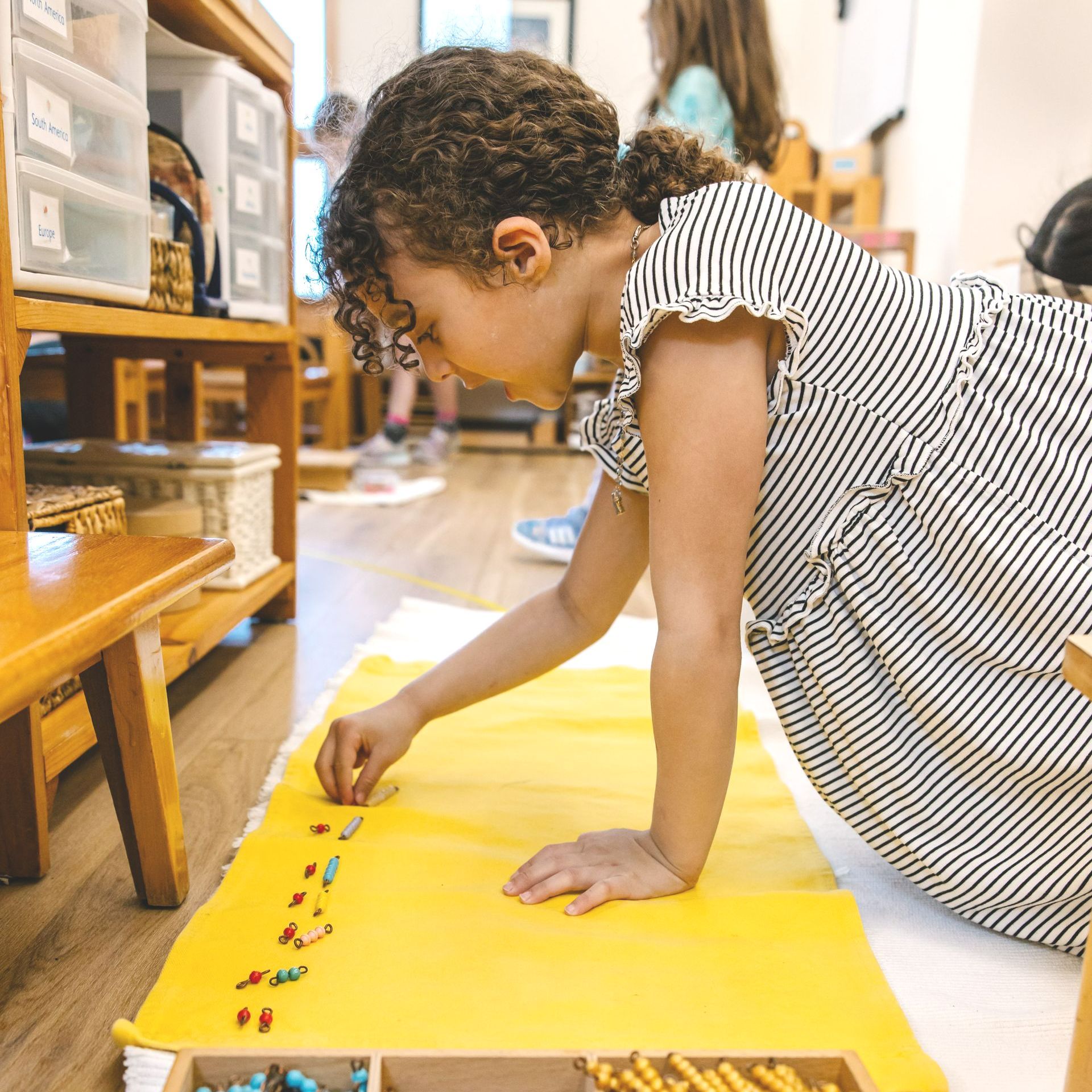By Carolyn Lanni, Primary Directress at the Montessori School of Lake Forest
 It is not easy to be a Montessori Parent. Tolerating your child’s shoes being on the wrong feet, sitting on your hands while they flip their coat thirty times before finally getting it on their body independently, and remaining unemotional but empathetic during meltdowns all come with the territory. Another aspect of Montessori that can be difficult to accept as a parent is the idea of valuing “process over product.”
It is not easy to be a Montessori Parent. Tolerating your child’s shoes being on the wrong feet, sitting on your hands while they flip their coat thirty times before finally getting it on their body independently, and remaining unemotional but empathetic during meltdowns all come with the territory. Another aspect of Montessori that can be difficult to accept as a parent is the idea of valuing “process over product.”
Most of the work a child does in their Primary class does not involve the creation of a physical product that the child can take home to show Mom and Dad, especially when they are on the younger end of the spectrum. Instead, the experience itself with the materials is what is important—not the completion of a worksheet, test, or other physical proof that a child has worked on a certain topic. That makes it tricky as a parent to know what your child is working on and how well they understand it. They are not bringing anything home for you to assess! And to make matters worse, when you ask your child what they did at school today, they answer, “Nothing.”
 The lack of “product” to show what a child is working on is deliberate in a Primary Montessori environment. Children in this plane of development learn through their hands. They need to feel, use, and experiment with concrete materials in order to understand the concepts behind them. That is why they trace sandpaper representations of sounds and numbers instead of just looking at them on a chalkboard, it’s why they use real, child-sized materials to scrub a table clean instead of just watching an adult do it for them, and it’s why they create shapes with wooden triangles on a rug instead of looking at pictures of different shapes in a book. The physical experience of using their hands to manipulate objects is how children in this age group internalize concepts and learn best. They learn by doing.
The lack of “product” to show what a child is working on is deliberate in a Primary Montessori environment. Children in this plane of development learn through their hands. They need to feel, use, and experiment with concrete materials in order to understand the concepts behind them. That is why they trace sandpaper representations of sounds and numbers instead of just looking at them on a chalkboard, it’s why they use real, child-sized materials to scrub a table clean instead of just watching an adult do it for them, and it’s why they create shapes with wooden triangles on a rug instead of looking at pictures of different shapes in a book. The physical experience of using their hands to manipulate objects is how children in this age group internalize concepts and learn best. They learn by doing.
Another reason we value “process over product” is we want to protect children’s natural intrinsic motivation, instead of relying on the extrinsic reward of praise from an adult. Children naturally have a love of learning, but when they are praised by an adult or get a smiley-face sticker for every worksheet they complete, they start to only want to do the work for the reward, instead of the self-fulfillment of accomplishing or learning something. They are more fulfilled when they are intrinsically motivated and see for themselves their own success than when they are judged and told whether or not they have succeeded.

Furthermore, the Montessori materials are carefully designed to have a “control of error,” which means that they show the child whether they understand or have completed a work. The trinomial cube box will only close if it’s built correctly, the button will only stay on the fabric if a child has sewn it on tightly, and there are only so many tickets for the short number chain of 5 and if you’ve counted to 24 instead of 25 then you know something has gone wrong. By and large, the materials themselves correct the children, so they do not rely on the adult for correction or praise, and they maintain their intrinsic motivation to learn and succeed.

At the same time, while many materials have a control of error, the Montessori environment also has a “friendliness with error.” We understand that people learn from the process of making a mistake, so when a child makes one, we don’t make a big deal about it. If they write a letter incorrectly in the sand tray, they shake it out and try again. If they call a parallelogram a rectangle, we kindly tell them its actual name. If a child writes 1675+2356=4132 instead of 4131, we might not even correct them if it’s early on in the use of that material. We understand that going through the process, experiencing the material, and making mistakes is how they are going to learn. Our focus is on the process, not the product itself.
As the adults trying our best to guide children as they grow and learn, we must accept that sometimes the best way to assess the child is to observe or ask them to show you how to do something, instead of relying on the completion of a worksheet or other physical product. Keeping in touch regularly and attending conferences with the teacher is also a good way to know how a child is doing in different areas of their learning. It is not easy to be a Montessori parent, but with patience, understanding, and good communication between parent and teacher, we can find the balance between supporting a child’s education while respecting “process over product.”
The post Process Over Product in the Montessori Primary Classroom appeared first on Montessori School of Lake Forest.
Montessori School of Lake Forest
Montessori School of Lake Forest




